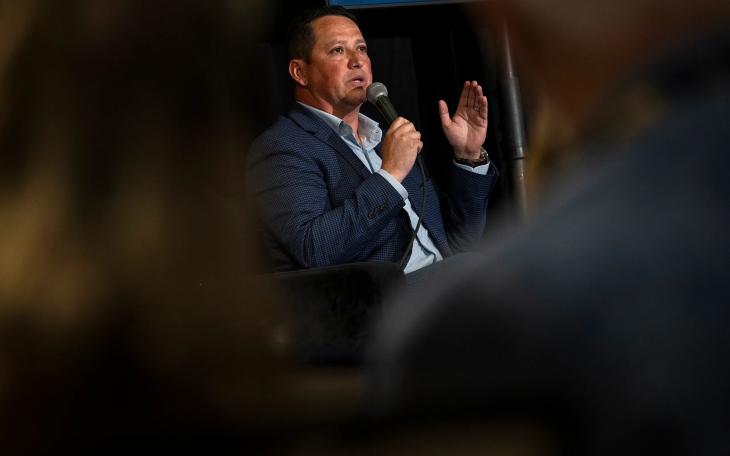“Winkie, you’re out of line!” Mayor Dwain Morrison said with a raised voice from his seat on the dais during an argument over a council proclamation that did nothing but stir the pot in the Hill Street frac sand depot controversy. H.R. “Winkie” Wardlaw, the conservative lawyer with a slow Texas draw and a low voice was pontificating at the podium during a public comments segment at yesterday's city council meeting about how the council should word the language stronger or do nothing at all.
Word of the frac sand depot spread quickly three months ago when citizens were alerted that the city had permitted a sand transfer facility to be built behind Mayfield Paper just off Hill Street next to the old railroad tracks. By today, YouTube videos featuring Barnhart and Big Lake residents’ struggles with silica sand escaping into the air are among the most shared on local social media. Even the Houston Chronicle has come all the way out here to investigate.
Back when the controversy began at the Oct. 24 San Angelo City Council meeting, Councilman Don Vardeman requested from city staff something, anything for the council to vote upon. His intention was to show the public that the council was in agreement that the Hill Street sand facility should not be approved.
The way the city government is structured does not allow the council to intervene in these kinds of decisions. Once city planner Patrick Howard’s staff ruled that frac sand trans-loading facilities fit the “light manufacturing” zoning definition, Hill Street was approved. The only recourse for citizens, now organized into groups and lawyered up for a long legal battle, was to appeal Howard’s decision at the Zoning Board of Adjustments, or ZBA.
The ZBA is comprised of five citizens appointed by individual councilmembers and approved by a vote of the entire council, usually en masse like three were appointed yesterday.
Local builder David Nowlin chairs the ZBA. He said that obviously when a councilman appoints him, he believes there is an expectation that the appointee will vote in accordance with the sponsor’s desires and beliefs. In Nowlin’s case, Councilman Johnny Silvas appointed him, but Nowlin said Monday that Silvas hasn’t given him guidance on how to vote on the Hill Street facility. It’s not that Nowlin wants or needs direction either. “I’ve haven’t even given Silvas a chance to air the question,” Nowlin said. To Nowlin, the ZBA is an independent board, and if the councilperson sponsoring each of them ever was dissatisfied with the board member’s vote, they can always fire them. Councilman Rodney Fleming fired Eric Eggemeyer from the City’s Design and Historic Review Commission over the Angry Cactus last year.
The Hill Street trans-loading facility controversy has put the spotlight on Nowlin’s chairmanship. In his four years serving the city on the ZBA, he said he has never seen so much attention on a single issue.
Nowlin said that the ZBA’s job on Feb. 2, when both sides of the Hill Street controversy will argue their case before his board, is to decide if Patrick Howard’s team made a mistake. Their ruling will not change zoning ordinance; only city council can do that. Nowlin said his board will answer this simple question, ”Is the proposed sand transfer facility heavy or light manufacturing?”
Unlike other city boards and commissions, council cannot overrule the ZBA decision. If one side or the other isn’t satisfied with the ZBA decision, the next step is the courthouse. And that’s why city lawyers are leading the council by the nose, burying their response to a political firestorm in heavy legal language as to not make it appear that council is attempting to exert undue influence on the ZBA.
Wardlaw, who is a former councilman, thinks the council is receiving bad legal advice. He wants the council to exert its power as an elected body and stop the lunacy.
The whole council disagreed with the legal advice too, and Tuesday’s discussion started with carefully talking around mentioning specifically the Hill Street facility, to all-out naming it, possibly horrifying the city’s legal staff. Mayor Dwain Morrison opened the floor up for public comment with the explicit instructions that the commenters could only say that they are for or against the proclamation. Nothing else.
No one followed the order, and that led to Morrison’s admonishment of Wardlaw.
Pinnacle Sands
The elephant in the room wasn’t Hill Street, however. It was a much larger trans-loading facility proposed to be built on the far northeast corner of the city to be operated by Pinnacle Sands, LLC. Some councilpersons had expressed their support of the Pinnacle project and they didn’t want to condemn it with a meaningless proclamation that effectively condemned all sand transfer facilities within the city limits
The proclamation:
The Council for the City of San Angelo acknowledges the considerable public opposition to future developments of frac sand mining, processing, storing, trans-loading and transporting operations within the corporate limits of the city and determines that it is necessary and in the best interests of the public, including the protection of the public health and safety of the residents of the City of San Angelo, Texas, that the Council express its concern for the potential negative impacts of such developments on the health and safety of the community, including impacts directly related to airborne pollution, increased commercial truck traffic, street maintenance, property values, and the overall quality of life for residents in the community.
Before yesterday’s council meeting Pinnacle withdrew their petition for annexation of their 175 acres on the northeast side of town, north of the city dump. If council voted down the annexation yesterday, the matter would not be eligible to be voted upon again for 12 months. Perhaps Pinnacle thought the rancor over frac sand was too much at the first reading of their requested annexation ordinance at the first council meeting this month.
After the meeting, Mayor Morrision said that he now supports the Pinnacle annexation, and thinks it will pass. At the previous meeting, Morrision said not many on council, including himself, fully understood what Pinnacle was proposing. Morrison’s primary objection at the first reading was the amount of water such a facility may use in wetting down the roadways. “Pinnacle said they’d pave the entire lot if they have to, to keep the dust down,” Morrison said.
Morrison said that Pinnacle has reached out to all of the members of council and explained more in-depth what the operation is all about.
Morrison said that the Pinnacle operation would relieve the need for the Hill Street facility, and also reduce the traffic considerably at the Hughes Street operation.
He likes the idea of building a bigger, cleaner trans-loading facility as far from the population centers of town as possible, yet still in the city limits, enhancing the city’s tax base.
The vote on the proclamation against all frac sand facilities inside the city limits failed yesterday. That paves the way for the annexation of the land for the Pinnacle facility. It will likely move forward at the next council meeting, if Pinnacle is willing.
Subscribe to the LIVE! Daily
Required






Comments
Listed By: Red Neck
Could it be his dog's name or maybe somthing else?
- Log in or register to post comments
PermalinkListed By: Doctor Ding-bat
I think it's funny how grown adults act like a bunch of idiots over something that's not going to happen anyhow.... Oil production companies that flew in over night 2 years ago are now turning out the lights and locking the gates behind them and moving everything up North. Of bigger concerns that the city should be worrying about is what they are going to use about 8 vacant hotels here in town by the end of the year.....
- Log in or register to post comments
PermalinkPost a comment to this article here: